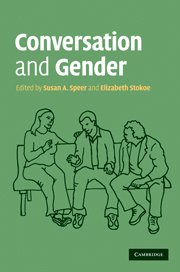Book contents
- Frontmatter
- Contents
- Contributors
- Data and transcription
- 1 An introduction to conversation and gender
- Part I Gender, person reference and self-categorization
- Part II Gender, repair and recipient design
- Part III Gender and action formation
- Part IV Gender identities and membership categorization practices
- 11 Accomplishing a cross-gender identity: A case of passing in children's talk-in-interaction
- 12 Engendering children's play: Person reference in children's conflictual interaction
- 13 Being there for the children: The collaborative construction of gender inequality in divorce mediation
- 14 Gender as a practical concern in children'smanagement of play participation
- References
- Author index
- Subject index
14 - Gender as a practical concern in children'smanagement of play participation
Published online by Cambridge University Press: 05 June 2012
- Frontmatter
- Contents
- Contributors
- Data and transcription
- 1 An introduction to conversation and gender
- Part I Gender, person reference and self-categorization
- Part II Gender, repair and recipient design
- Part III Gender and action formation
- Part IV Gender identities and membership categorization practices
- 11 Accomplishing a cross-gender identity: A case of passing in children's talk-in-interaction
- 12 Engendering children's play: Person reference in children's conflictual interaction
- 13 Being there for the children: The collaborative construction of gender inequality in divorce mediation
- 14 Gender as a practical concern in children'smanagement of play participation
- References
- Author index
- Subject index
Summary
Introduction
In everyday life, people act in ways that are observably gendered. That is to say, as members of society we are capable of understanding human behaviour in terms of (the two available) gender categories. What is more, as Garfinkel (1967) has pointed out, we are overwhelmingly prone to do so. According to Kessler and McKenna (1978), this process of gender attribution, albeit mostly unnoticed, forms one of the ways through which people crucially make sense of one another's actions. This can become acutely noticeable when, for instance, we find ourselves unable to tell a person's sex or, more often, when we notice people engaging in actions typically associated with the other gender. But the process of gender attribution does not merely concern (other) people: we sometimes conceive of certain actions, activities, traits, preferences and so on in terms of gender binaries. Here, researchers within ethnomethodology, and its allied disciplines of conversation analysis and discursive psychology, have come to articulate a view of gender as a form of social and cultural practice (see, e.g., Fenstermaker & West, 2002; Hopper & LeBaron, 1998; McIlvenny, 2002a; Nilan, 1995; Speer, 2005a; Stokoe, 2004; 2006; West & Zimmerman, 1987; Wowk, 1984, for some central discussions of an ethnomethodological approach to the study of gender). In this growing body of work we find, in a very general sense, a view of gender as something that emerges between people, rather than resides within them.
- Type
- Chapter
- Information
- Conversation and Gender , pp. 294 - 309Publisher: Cambridge University PressPrint publication year: 2011
- 2
- Cited by



